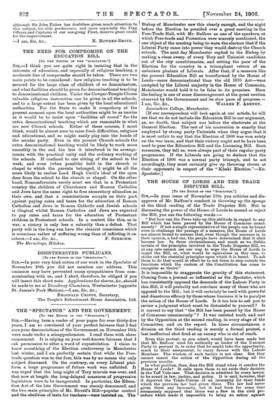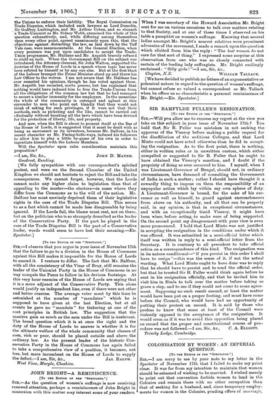THE HOUSE OF LORDS AND THE TRADE DISPUTES BILL.
[To THE EDITOR OP THE "SPECTATOR.'] SIE,..4n your issue of November 17th you criticise and dis- approve of Mr. Balfour's conduct in throwing up the sponge at the third reading of the Trade Disputes Bill. But in discussing the power of the House of Lords to amend or reject the Bill, you use the following words :— " But how can the Peers take up this attitude in regard to any Bill which has been passed by the House of Commons unani- mously? If not a single representative of the people can be found even to challenge the passage of a measure, the House of Lords are almost bound to assume that, even though the measure is, in their opinion, a bad one, the people have determined that it shall become law. In these circumstances, and much as we dislike certain of the principles involved in the Trade Disputes Bill, we at any rate cannot see our way to urge the House of Lords to reject the Bill, or, what would be equivalent in this case, to strike out the essential principles upon which it is based. To ask them to do that would in effect be to ask them to step outside the functions which the custom of the Constitution has come to recognise as theirs."
It is impossible to exaggerate the gravity of this statement. Coming from a journal so influential as the Spectator, which has consistently opposed the demands of the Labour Party in this Bill, it will probably not convince many of those who are opposed to the Bill; but it will certainly be used with powerful and disastrous efficacy by those whose business it is to paralyse the action of the House of Lords. Is it too late to ask you to review a judgment which must be distasteful to yourself ? Is it correct to say that "the Bill has been passed by the House of Commons unanimously " ? It was resisted tooth and nail by the Opposition at the second reading, in every stage of the Committee, and on the report. In these circumstances, a division on the third reading is merely a formal protest, a last ineffectual shot fired at an enemy who is (nit of reach.
Even this protest, as you admit, would have been made but that Mr. Balfour used his authority as leader of the Unionist Party to prevent it, in order that he might take the opportunity, much to their amazement, to curry favour with the 'inborn. Members. The wisdom of such tactics is not clear. But they cannot cancel the action of the Opposition during all the previous months. In what position, then, does the Bill stand when it reaches the House of Lords ? It calls upon them to set aside their decision In the Taff Vale case. That decision is admitted by every lawyer to be sound in law, justice, and policy. It is said, however, that it deprived the Trade-Unions of an immunity for their funds which the previous law had given them. The law had never given them any immunity, but it had been for some time erroneously supposed that there was a flaw in the civil pro- cedure which made it impossible to bring an action against
the Unions to enforce their liability. ' The Royal Commission on ..Trade Disputes, which included- such lawyers as Lord Dunedin, Sir Godfrey Ltuthington, and Mr. Arthur Cohen, and so staunch
a Trade-Unionist R8 Mr. Sidney Webb, examined the whole of this question exhaustively, and, while differing aniong themselves upon every other point, agreed unanimously upon this, that the objections against, disturbing the law, as laid down by the Taff Vale case, were insurmountable. At the General Election, when every pressure was put upon candidates to accept the Trade- Union programme, Mr. Haldane and Mr. Asquith bravely refused to yield an inch. When the Government Bill on the subject was introduced, the Attorney-General, Sir John Walton, supported the doctrine of the House of Lords in a speech whose logic has never been refuted by himself or by any one else. But at the first blast of the Labour trumpet the Prime Minister stood up and threw his Law Officer to the wolves. I am not aware that Mr. Haldane has ever recanted his opinions, though he has voted against them. Mr. Asquith has recanted, multa gernens, but has explained that nothing would have induced him to free the Trade-Unions from all the obligations of the common law but that he had managed to secure a similar immunity for the employers. In the meantime the whole of the community is outraged and aghast at this surrender to men who point out blandly that they would not think of asking for such privileges, if it were not that their methods, such as picketing and the like, cannot be carried out effectually without breaking all the laws which have been devised for the protection of liberty, life, and property.
And now, when the Bill is about to present itself at the Bar of the House of Lords, it is suggested that it must be dealt with as being as sacrosanct as its inventors, because Mr. Balfour, in his recent character as Mr. Facing-both-ways, induced his followers • to allow him to play a little by-game of his own in order to ingratiate himself with the Labour Members.
Will the Spectator upon calm consideration maintain this proposition ?
Goodrest, Reading.
[We fully sympathise with our correspondent's spirited
protest, and were we the Second Chamber of the United Kingdom we should not hesitate to reject the Bill and take the consequences. We cannot forget, however, that the Lords cannot make any higher claim to legislation than that of appealing to the master—the electors—in cases where they differ from the Commons as to the will of the nation. Mr. Balfour has most unwisely deprived them of their legislative rights in the case of the Trade Disputes Bill. This seems to us a fact which cannot be made less disagreeable by being ignored. If the Lords fail, the blame must rest, not on them, but on the politician who is so strangely described as the leader of the Conservative Party. If the part he played in the case of the Trade Disputes Bill is the part of a Conservative leader, words would seem to have lost their meaning.—En. Spectator.]















































 Previous page
Previous page